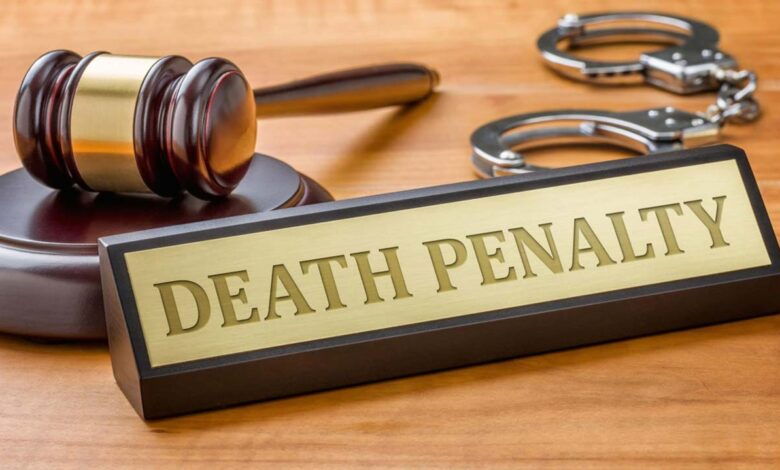Why the Death Penalty has to go

NAFDAC Director-General Prof. Mojisola Adeyeye made this death sentence demand against drug counterfeiters because she intensely cares about their destructive effects on public well-being. The recent plea for capital punishment from the Director-General of NAFDAC once more aggravates the ongoing ethical and constitutional discussion about death penalty applications within Nigerian legal systems.
According to Adeyeye illicit drug dealers and drug barons function as “merchants of death” because they murder their fellow human beings while pursuing massive illegal income. According to the writer death should serve as the proper punishment for those convicted of drug peddling.
Brig. Gen. Buba Marwa (rtd) took an equivalent stance while speaking at the amendment debates for the 2004 National Drug Law Enforcement Agency Act throughout last year. The issue of death penalty for drug offenders split the National Assembly into two separate chambers when each debated the matter.
The Senate introduced capital punishment but the House of Representatives selected life imprisonment as the punishing sentence. During the adoption of the conference committee report between both chambers the National Assembly chose to impose life imprisonment for drug peddlers instead of the death penalty.
Admittedly, there has been a considerable rise in the crime rate, especially among youths, due to the increasing rate of drug abuse. It is estimated that 15 million Nigerians, aged between 15 and 64 years, abuse drugs. The impacts are visible. Drug and substance abuse, especially among the country’s largely youthful population, is increasingly fuelling political thuggery, constituting both a present and future danger.
However, the death penalty may not be the solution to the menace of illicit, fake drugs and adulterated products in Nigeria or even any other capital offence. The debate over the death penalty, as in other countries, has persisted in Nigeria over the years. Although Section 33 (1) of the 1999 Constitution allows the death penalty in certain circumstances, Nigerian state governors are no longer signing death warrants.
Related News
- “Avoid Spraying Perfume on Armpits and Private Parts”- Shehu Sani
- Plateau Killings: Peter Obi Visits Plateau Attack Victims, Donates N7.5 Million in Relief Support
- FG launches flood readiness campaign in 30 high-risk states
- NFF Mourns Passing of 1980 AFCON Winner Charles Bassey
- Operating Online Forex Platforms Without Registration Is Illegal- SEC
Two men convicted of murder received a death sentence when Nasir El-Rufai became the first Nigerian state governor to issue warrants in 2016 as governor of Kaduna State. The execution warrants El-Rufai signed sparked significant national debate concerning capital punishment because Nigeria’s execution free period in diverse states lasted for numerous years.
The death penalty laws in Nigeria continue to have no executions because since 2016 on numerous states have not issued death warrants despite their current death penalty statutes. The temporary ban on executions failed to free those convicted to death who stay on death rows. Such lifelong detention for condemned prisoners violates their constitutional and African Charter rights to basic human respect according to Section 33 of the 1999 Constitution and Article 4 of the African Charter on Human and People’s Rights that Nigeria has adopted.
The long indefinite period of imprisonment while waiting for execution without a signed death warrant creates mental torture as a separate punishment for accused persons serving death sentences. The condemned prisoners slowly perish while waiting for execution from a hanging executioner who might never appear. Their basic human rights to personal freedom and dignity of the human person receive violation during this period.
In Peter Nemi v. Attorney-General of Lagos State the Supreme Court confirmed that life remains an available right even for prisoners scheduled for execution until execution procedures fulfill the law requirements. The Supreme Court declared through Attorney-General of Lagos State that life protection stands for condemned prisoners until their execution process meets legal requirements. The denial of basic rights solely because someone faces execution stands opposite civilized conduct because it diminishes the natural worth of human beings.
Also Read: EFCC Arraigns Bauchi Officials in ₦8.3bn Financial Fraud Case
This newspaper has maintained an established stance that human life possesses absolute value and cannot be killed by humans because the power belongs exclusively to God as the Creator. Human life represents the first and greatest gift which reflects its value through the Latin maxim vivere viventibus est esse (“To living things, life is existence”).
This newspaper supports that drug barons convicted of crimes should avoid facing execution by the state. We believe death row prisoners should not continue their long-term incarceration because state governors hesitate to approve death warrants. A refusal by state governors to authorize death warrants should be followed by converting death sentences into life imprisonment terms. Prisoners on death row suffer an unbearable injustice through indefinite detention which depends on state governors to decide their fate despite their ongoing incarceration.
Popular findings show that death penalty failures to prevent capital crimes and some prisoners face wrongful conviction based on legal justice deficiencies making the need for complete abolition clear to legislative officials throughout the nation.
The lawmaking bodies should create new provisions which require death sentences to convert to life imprisonment without state governor approval. A new piece of legislation should mandate that death warrants requiring gubernatorial approval will become life imprisonment sentences after three or four months of missed signing.
Through the Lagos State Administration of Criminal Justice Law 2015 Section 470(1)(c) allows the Administration of Criminal Justice Monitoring Committee to maximize decongestion efforts of correctional centers to their minimum capacity.




